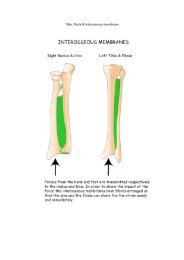GSM 11.14 - Version 5.2.0 - Digital cellular ... - Ttfn.net
GSM 11.14 - Version 5.2.0 - Digital cellular ... - Ttfn.net
GSM 11.14 - Version 5.2.0 - Digital cellular ... - Ttfn.net
Create successful ePaper yourself
Turn your PDF publications into a flip-book with our unique Google optimized e-Paper software.
Page 21<br />
<strong>GSM</strong> <strong>11.14</strong> version <strong>5.2.0</strong>: December 1996<br />
Where the text has been packed, the text string provided by the SIM shall not be longer than<br />
160 characters. It shall use the SMS default 7-bit coded alphabet, packed into 8-bit octets, in accordance<br />
with <strong>GSM</strong> 03.38 [5]. The text length (which is part of the SMS TPDU) given by the SIM shall state the<br />
number of 7-bit characters in the text string. The command details shall indicate "packing not required".<br />
8-bit data Short Messages may be sent by the SIM. The command shall indicate packing not required. The<br />
string shall not be longer than 140 bytes, and the length (in SMS TPDU) shall state the number of bytes in<br />
the string.<br />
SMS commands may be sent by the SIM. These shall count as packed text message. The SMS TPDU<br />
from the SIM shall indicate SMS-COMMAND. The command details shall indicate "packing not required".<br />
Where packing by the ME is required, the text string provided by the SIM shall not be longer than<br />
160 characters. It shall use the SMS default 7-bit coded alphabet as defined in <strong>GSM</strong> 03.38 [5] with bit 8<br />
set to 0. The text length given by the SIM shall state the number of characters in the text string. The ME<br />
shall pack the text string in accordance with <strong>GSM</strong> 03.38 [5] before submitting the message to the <strong>net</strong>work.<br />
If the ME is capable of SMS-MO, then it shall send the data as a Short Message TPDU to the destination<br />
address. The ME shall give the result to the SIM using TERMINAL RESPONSE (indicating successful or<br />
unsuccessful transmission of the Short Message) after receiving an SMS RP-ACK or RP-Error from the<br />
<strong>net</strong>work.<br />
6.4.11 SEND SS<br />
Upon receiving this command, the ME shall decide if it is able to execute the command. Examples are<br />
given below, but the list is not exhaustive:<br />
- If the command is rejected because the ME is busy on a SS transaction, the ME informs the SIM<br />
using TERMINAL RESPONSE (ME unable to process command - currently busy on SS transaction);<br />
- If the command is rejected because the ME does not support that Supplementary Service, the ME<br />
informs the SIM using TERMINAL RESPONSE (Command beyond ME's capabilities).<br />
If the ME is able to send the SS request, the ME shall:<br />
- Send the SS request immediately, without need to alert the user first. Optionally, the ME can give<br />
some audible or display indication concerning what is happening.<br />
- Once a SS Return Result message not containing an error has been received from the <strong>net</strong>work, the<br />
ME shall inform the SIM that the command has been successfully executed, using TERMINAL<br />
RESPONSE. This command shall include the contents of SS Return Result as additional data.<br />
Optionally, the ME may display the result on screen.<br />
- If the command is rejected because the <strong>net</strong>work cannot support or is not allowing the<br />
Supplementary Service request, the ME informs the SIM using TERMINAL RESPONSE (SS Return<br />
Result error code);<br />
- If the SS request is unsuccessfully received by the <strong>net</strong>work, the ME shall inform the SIM using<br />
TERMINAL RESPONSE (<strong>net</strong>work currently unable to process command), and not retry to send the<br />
request.<br />
6.4.12 SEND USSD<br />
For further study.








